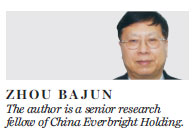Conditions for a 'third way'in Hong Kong politics
Updated: 2015-07-08 07:51
By Zhou Bajun(HK Edition)
|
|||||||
Last Wednesday saw the 18th anniversary of the founding of the Hong Kong Special Administrative Region of the People's Republic of China. Notably, after experiencing the "One Country, Two Systems" principle for 18 years, the relationship between Hong Kong and the mainland faces significant challenges. For example, following a drop of mainland visitors to the city, applications for university places in Hong Kong by mainland students have fallen this year, too. Two universities even saw a 40 percent fall from last year. Meanwhile, the local community's seemingly indifferent response to the blocking of the government's electoral reform bill by opposition lawmakers cannot conceal the fact that Hong Kong people are deeply divided over the issue of selecting the Chief Executive by universal suffrage. At present, many Hong Kong residents are wondering: Where should "One Country, Two Systems" go from here?
Despite the HKSAR Government's proposed constitutional reform package for the election of the Chief Executive via universal suffrage suffering a setback in the Legislative Council last week, the central government has reiterated that its aim to implement the principle of "One Country, Two Systems" remains. Therefore, Hong Kong people have to bring the opposition back to the right track in implementing the "One Country, Two Systems" policy.
Recently some moderate "pan-democrats" expressed a wish to consider a "third way", or middle path, in political discourse. This is to help rid Hong Kong of endless confrontation between two political camps. On June 22, Ronny Tong announced that he was quitting the Civic Party immediately and would resign from the Legislative Council as a legislator effective on October 1. Tong said at a press conference that as a founding member of the Civic Party he had been disappointed at the party's change of political line. Initially, he hoped the party could build a positive relationship with the central government to search for greater room to rule the city democratically under "One Country, Two Systems". But the party's radical political line had driven him to take this "very painful decision". Tong established a new think tank - Path of Democracy - with some "moderate pan-democrats" on June 8. The think tank may eventually turn into a political organization trying to experiment with the "third way".
What does the "third way" mean? Tong explained at the press conference on June 22, "I hope there is a political party in Hong Kong which represents the views of the middle-of-the-road people. Taking the middle ground approach doesn't mean you give up the fight for democracy or are being subservient to the central government."
However, under the current political situation, anyone seeking the "third way" has to outspokenly counter the movement of "Hong Kong independence". It is imperative for those who label themselves as "moderate pan-democrats" to resolutely distance themselves from the radicals. Without this, the "moderate pan-democrats" cannot forge a positive relationship with the central government.
The second necessary condition for practicing the "third way" is for them to publicly admit that the only constitutional basis for Hong Kong's electoral reform is the Basic Law, as well as the relevant decisions made by the Standing Committee of the National People's Congress. Otherwise the "moderate pan-democrats" will find their efforts have been futile.
The third necessity for effectively practicing the "third way" is the most difficult one: They must align their so-called "core values" with the implementation of "One Country, Two Systems".
"One Country, Two Systems" is an unprecedented experiment. Universal suffrage in the HKSAR naturally has its unique characteristics, and is different from Western models. If the "moderate pan-democrats" insist on "international norms", they will fail in their drive to promote constitutional development in HK by taking a "third way". To reach a consensus on implementing universal suffrage, the "moderate pan-democrats" have to modify the "core values" in their minds.

(HK Edition 07/08/2015 page9)